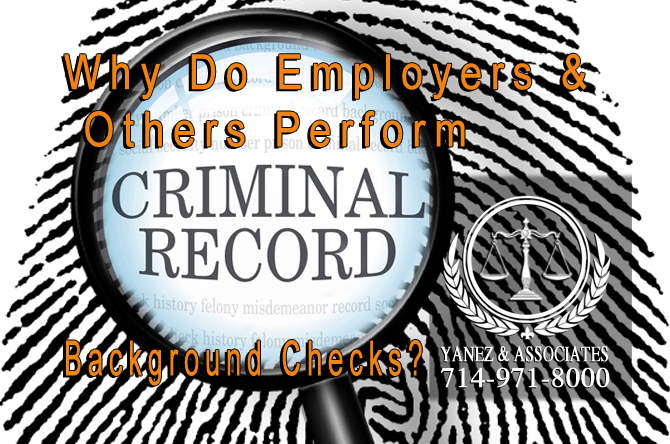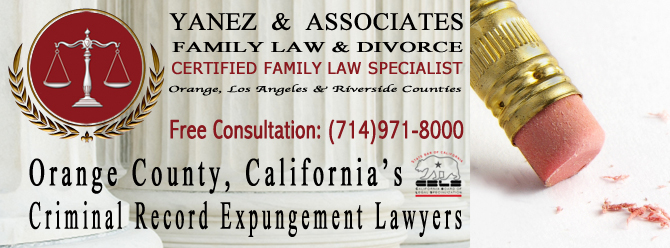Understanding the Basics of Criminal Record Background Checks in OC California
Employers, landlords and other parties perform criminal record background checks to determine whether a specific person has a criminal past, and to obtain other information about that person’s activities. These checks can be performed by conducting an independent review of local, county, state, national and federal court records, or by using the services of a Consumer Reporting Agency. Under the Fair Credit Reporting Act (FCRA) certain individuals are provided with the right to perform a consumer background check to receive information about your criminal past, employment history and credit score. However, there are often laws in place that govern the manner in which information obtained from criminal records and background checks can be used. For example, here in California, potential employers can ask you to submit to a background check, but they are prohibited from asking about any detention or arrest that did not result in a conviction.
What is a Consumer Reporting Agency?

What is a Consumer Reporting Agency and what data do they collect?
Consumer Reporting Agencies (CRAs) are organizations that collect a wide variety of data and information about people. CRAs primarily pull data from both public and private databases and create reports with the results of their findings. CRAs sell these consumer background reports to landlords, lenders, employers and other businesses. Some of the common information that CRAs include in their consumer background check reports include:
• Leasing and home ownership history
• Check-writing past
• Employment history
• Medical payments and records
• Utility bills payment history
• Past insurance claims
Some of the specific information about your criminal past that CRAs report include:
• Past convictions
• Arrest records
• Past criminal sentences
• Drivers’ license suspensions
• Theft reports
• Other information collected from sex offender registries and law enforcement records.
CRAs are regulated by the United States Federal Trade Commission (FTC), and under federal law, CRAs are only allowed to report on arrests that go back seven years.
Where Do CRAs Pull Report Information From?

What records Do Credit Reporting Agencies access for my background check ?
For a fee, CRAs provide background checks that consist of data that has been collected from an assortment of registries and databases. Some of the more common sources of criminal record background check information include:
• Federal Records: These records can be used to locate an assortment crimes that were prosecuted under federal law. Common information pulled from these records include federal court cases involving fraud, tax evasion and embezzlement.
• National Records: These records are used to uncover information about crimes that may have been committed outside of a specific person’s place of residency. These are often used in conjunction with searches of local records, because some municipalities do not always provide criminal record reports in a timely fashion.
• County Records: The databases of the United States 3,000+ counties can be searched to find violations of local statutes and laws.
• Department of Motor Vehicle (DMV) Records: State DMV records can be used to obtain a person’s driving records, and to determine whether DUIs or other traffic offenses were committed.
• Civil Court Records: The records of upper and lower civil courts can be accessed to determine whether a person has been involved product liability, personal injury or small claims lawsuits.
• Sex Offender Registries: Available are both national and state registries that contain lists of those who are registered sex offenders.
• Restricted and Prohibited Parties Lists: These records contains lists of individuals that are prohibited from being hired in the United States because they are known drug traffickers, terrorists, illicit arms dealers, money launderers or are subject to national economic sanctions.
• Bankruptcy Records: Federal records regarding bankruptcy filings can be accessed for adjudicated cases.
• Foreign Records: Searches of international records can be used to review the background of foreign individuals.
The ability to access the above records and lists depends on the resources of the CRA. Oftentimes the type of record searched will depend on the unique needs of the party requesting the criminal record background check.
Why Do Employers and Others Perform Criminal Record Background Checks?

Why Do Employers and Others Perform Criminal Record Background Checks, and what can they learn?
A criminal record background check is used to learn a broad assortment of information about person. Lenders often use background checks to determine whether or not to extend credit or another financial service by reviewing a person’s past history of repayment, loan and credit history and other financial transactions. Landlords, similarly perform background checks in order to determine whether a potential tenant pays their bills on time, and also to determine if that person could present a risk to the community. Employers often perform background checks to ensure that employing a specific person will not result in violation of a specific licensing requirement or labor law.
Do I Have to Submit to a Background Check?

Am I required to Submit to a Background Check in OC California?
You are not required to submit to a background check if you do not want to. However, it is often within your best interests to consent to a background check because employers and landlords typically condition their review and approval of applications upon such consent. Typically, employers, landlords and other parties are required be law to first obtain your consent if they are going to review your credit report, or engage a CRA to perform a criminal background check. Here in California, though an employer could legally conduct their own search of public records to discover your criminal history, the law prohibits an employer from asking you above any arrest or detention that did not result in a conviction.
Yanez & Associates: Orange County, California’s Criminal Record Expungement Lawyers

Our firm can help you review your criminal record to determine whether a past conviction can be expunged.
Accessing your full criminal history can be the first step towards pursuing a wide assortment of employment, financial and housing opportunities. Though you may want to forget or ignore your past criminal activities, understanding what shows up on your criminal background check will allow you to understand how others see you and the specific reasons why your applications are being denied. Furthermore, it is a good time to understand and review your official criminal history in order to make sure that no false information or inaccuracies are improperly displayed on your record. The attorneys here at Yanez & Associates in Orange County, California can help you review your criminal record to determine whether a past conviction can be expunged. Give us a call today to discuss how we can help you repair your criminal record.












